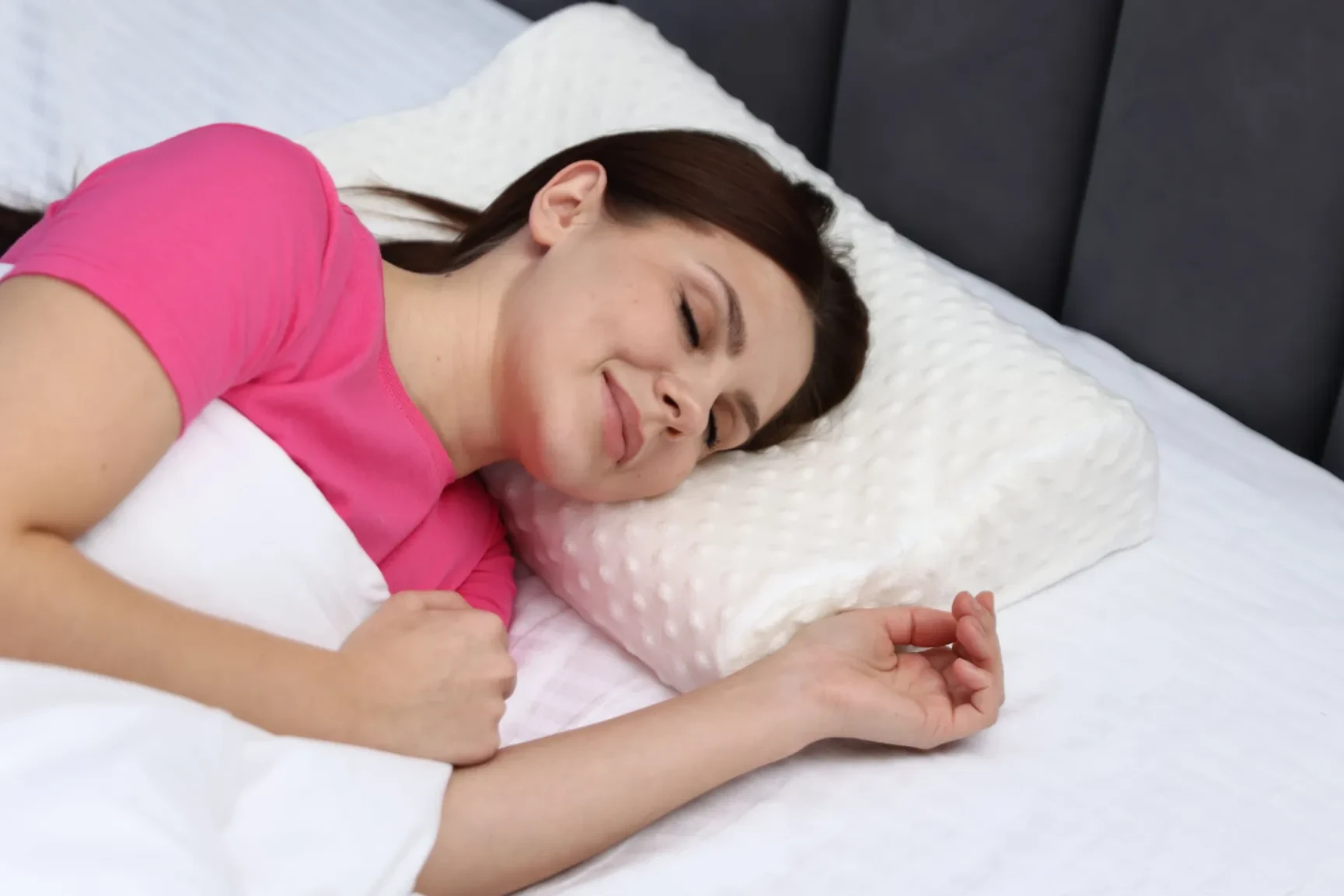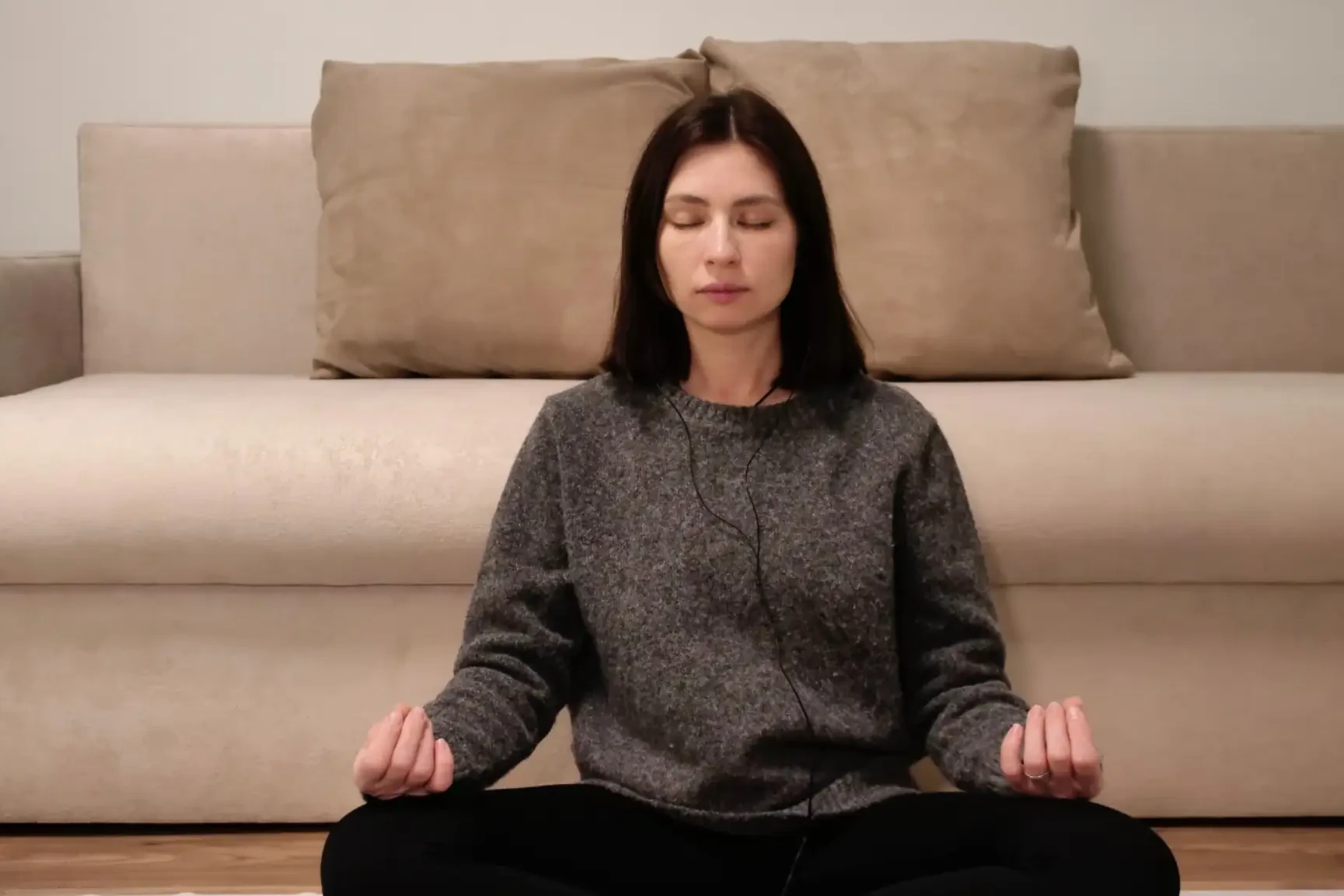Have you ever had a night where you barely slept and couldn’t focus the next day? Maybe your memory felt fuzzy, or you kept forgetting simple things. What you experienced isn’t just about being tired. It’s a real effect of your brain running on empty. Over time, missing sleep can seriously hurt how your brain works. That’s what this blog is all about, understanding the strong link between sleep deprivation and cognitive decline.
In this blog, we will explore how missing sleep affects the brain, what it does in the short and long run, how it connects to serious diseases like Alzheimer’s, and most importantly, how you can protect your brain by improving your sleep.
Table of Contents
ToggleUnderstanding Sleep Deprivation
Sleep deprivation is a big problem today. It hurts our brains, memory, and how we think. It happens when we don’t get 7 to 8.5 hours of sleep each night. This can be because of work, lifestyle, or sleep disorders.
Definition and Causes
Being awake for 24 to 72 hours is called acute total Sleep Deficiency. Chronic partial Sleep Deficiency means not getting enough sleep for many nights. Some people are more affected by sleep loss than others.
Common Symptoms
- Excessive sleepiness and fatigue
- Poor attention span and concentration
- Reduced adaptability and emotional control
- Impaired judgment and decision-making
Prevalence in Modern Society
About 32 to 39% of young and middle-aged adults sleep less than 7 hours a night. Chronic insomnia affects around 10% of people. Sleep problems are getting worse due to long work hours, busy lifestyles, and night shifts.
Read: Why Sleep Quality Matters More Than Sleep Quantity
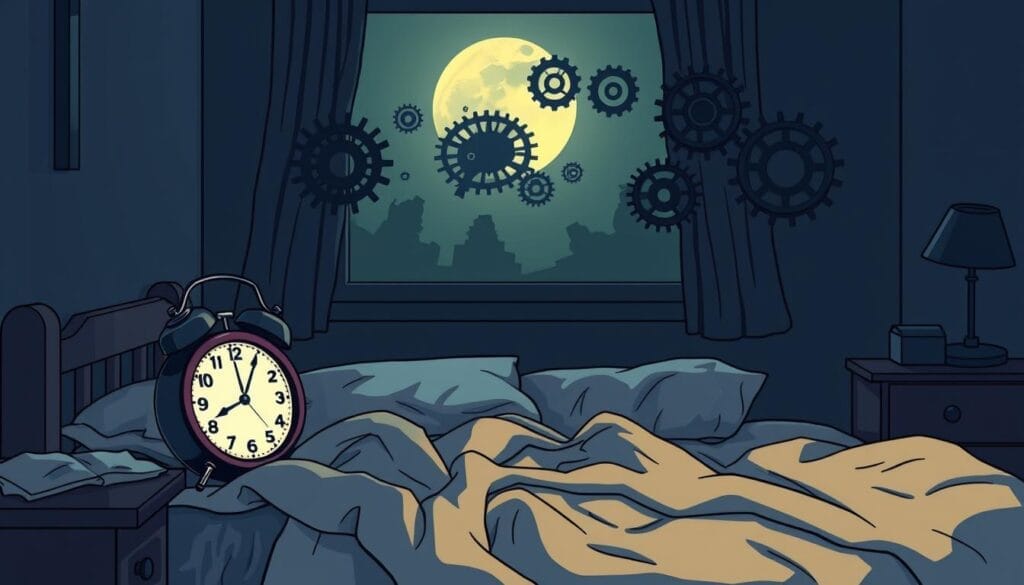
The Science of Sleep
During sleep, your brain goes through different stages. Each stage plays a special role in keeping your mind sharp and your memory strong.
- REM sleep helps with emotional balance and learning
- NREM (non-REM) sleep repairs brain cells and strengthens memories
- Deep sleep helps the brain clean itself
Here’s an amazing fact: According to the National Sleep Foundation, during deep sleep, the brain’s fluid system increases by 60%. This system flushes out waste proteins like amyloid-beta, which are linked to Alzheimer’s.
This cleaning process is done by something called the glymphatic system. Think of it as the brain’s janitor, sweeping out harmful trash while you sleep.
The brain also rewires itself during sleep. This is called brain plasticity. It helps you learn new things and remember them better. Without proper sleep, this doesn’t happen well.
Sleep Architecture and Cognitive Processing
Before we go deeper, let’s understand something called sleep architecture. This is the pattern of your sleep cycles each night. It includes the switch between light sleep, deep sleep, and REM sleep.
When sleep is interrupted, due to stress, noise, or health issues, this natural cycle breaks. The brain doesn’t get enough time in deep and REM sleep. That’s why you feel tired even after sleeping 7 hours with many wakeups.
Uninterrupted deep sleep and REM sleep are both needed for:
- Thinking clearly
- Solving problems
- Forming memories
So, good quality sleep is just as important as how long you sleep.
Read: Debunking the 8 Hour Sleep Rule: What You Need to Know

Studies show that bad sleep habits can harm our brain. People who sleep less than 8 hours often do worse on brain tests. Also, sleep problems like sleep apnea can increase the risk of brain issues like dementia. Sleep and brain health are closely linked, with many factors affecting this relationship.
Cognitive Functions Impacted by Sleep Deprivation
Sleep is key for our brain to work well. But, our busy lives often cut into our sleep. This can hurt our memory, problem-solving, and focus.
Memory Consolidation
Not getting enough sleep messes with how we remember things. It changes how our brain cells work in the hippocampus. This area is vital for keeping memories strong.
When we don’t sleep well, it’s harder to keep new memories. This is because our brain’s ability to strengthen memories is affected.
Problem-Solving Abilities
Being able to solve problems and adjust when needed is important. But, not sleeping enough makes this harder. It’s like our brain is foggy and can’t adapt well.
This can lead to poor decisions and trouble solving complex problems. It’s a big hit to our mental sharpness.
Read: 5 Yoga Poses for Better Sleep and Relaxation
Attention and Focus
Staying focused is key to getting things done. But, sleep loss can make it tough. We might find ourselves zoning out or even falling asleep without realizing it.
This can hurt our work, school, and even our safety. It’s a big risk, especially when driving.
In short, not sleeping enough is bad for our brain. It messes with memory, problem-solving, and focus. We need to make sleep a priority for our brain’s health.
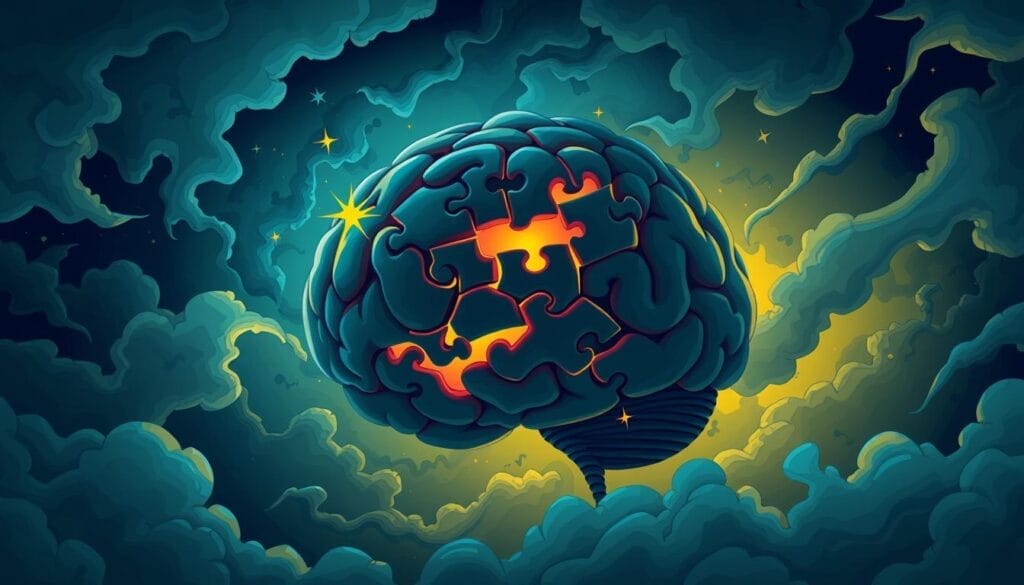
Long-Term Effects on Brain Health
Not getting enough sleep is bad for your brain. It can make you more likely to get Alzheimer’s disease. Up to 15% of Alzheimer’s cases might be because of not sleeping well.
Sleep helps clear out bad proteins from your brain. Just one night without sleep can make these proteins go up.
Poor sleep can also make your memory worse. It can lead to dementia. If you already have dementia, not sleeping well can make it worse.
Neurodegenerative Diseases
Not sleeping well can make you more likely to get Alzheimer’s and other brain diseases. Sleep helps protect your brain. Without it, your brain can get damaged.
Studies show that sleep helps keep your brain healthy. Without it, your brain can start to die off.
Memory Disorders
Not sleeping enough can hurt your memory. It can make it hard to remember things. This is because sleep helps your brain remember.
Overall Cognitive Decline
Not sleeping well can affect your job and relationships. It can make it hard to make quick decisions. This is bad for jobs that need fast thinking.
It can also make you more likely to argue. It can make you less interested in healthy activities. And it can lead to depression over time.
Getting enough sleep is key to keeping your brain healthy. It can help prevent long-term brain problems. If you have trouble sleeping, see a doctor like Dr. Chandril Chugh.
Sleep Deprivation in Different Age Groups
Everyone needs sleep, but the amount and impact differ across ages. From kids to seniors, sleep plays a key role in thinking, learning, and remembering.
Children and Teens: Impact on Learning
Kids need more sleep than adults. But screens, school stress, and poor routines often steal that time.
- Less sleep means poor focus in class
- They may forget what they learn
- Performance in exams and homework drops
Lack of rest also interferes with memory consolidation, the brain’s process of saving new facts.
Adults: Productivity and Decision-Making
Most working adults are sleep-deprived. But they may not notice how it affects their choices.
- Increased mistakes and missed deadlines
- Bad decision-making
- Trouble managing emotions and stress
This is the impact of sleep deprivation on mental performance, and it can lead to burnout over time.
Elderly: Sleep and Risk of Dementia
Older adults may sleep less deeply. But that doesn’t mean they need less sleep.
- Light, broken sleep increases the risk of dementia
- They may nap more during the day and sleep less at night
- Poor sleep can worsen conditions like Alzheimer’s or neurodegeneration
For the aging brain, sleep and brain health go hand in hand. It’s quality that matters most.
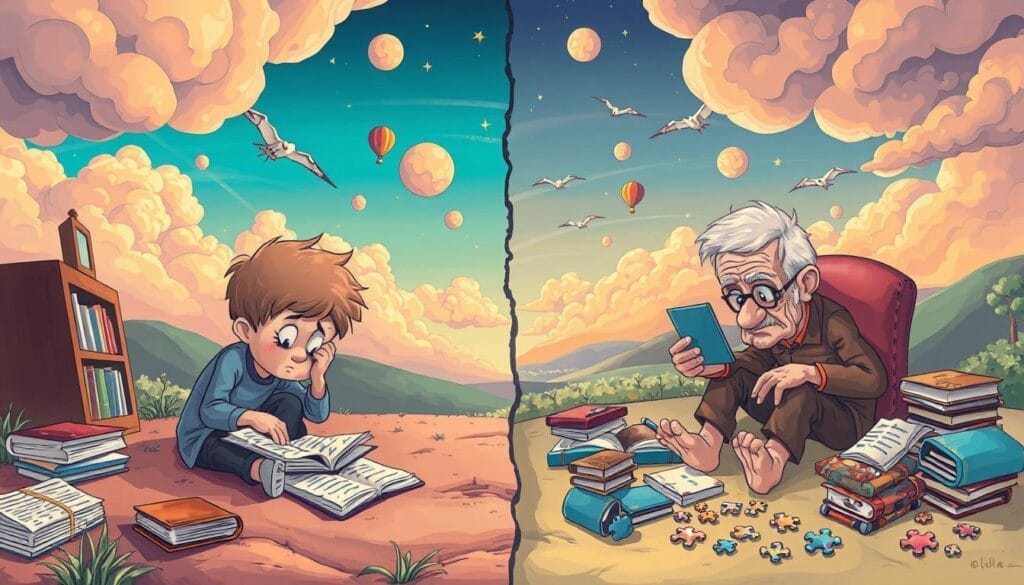
Everyone needs to focus on sleeping well for their brain. Doctors can help by finding ways to improve sleep for different ages. This helps keep brains healthy and sharp.
Lifestyle Factors Contributing to Sleep Deprivation
Getting a good night’s sleep is key for healthy sleep patterns. But, many lifestyle choices can lead to sleep deprivation. Stress, mental health issues, too much tech before bed, and tough work and school schedules are big problems.
Stress and Mental Health
Stress and mental health problems like anxiety and depression hurt sleep. They make it hard to fall and stay asleep. This poor sleep quality causes more fatigue and concentration issues, making stress and mental health worse.
Technology Use Before Bed
Electronic devices like phones and computers give off blue light. This light messes with our natural sleep cycle and melatonin levels. Too much screen time before bed is a big reason for sleep deprivation.
Work and School Schedules
Busy work and school schedules, especially shift work or early starts, cause sleep loss. This affects our ability to sleep well and focus during the day.
By tackling these lifestyle issues, we can improve our sleep and overall health. This boosts our cognitive function and daily performance.
How to Improve Sleep and Protect Brain Health
Even if you’ve had years of poor sleep, it’s never too late to make things better. Small changes can lead to big improvements in how your brain functions.
Healthy Sleep Hygiene Tips
Creating a peaceful bedtime routine can help your brain fall into healthy sleep patterns.
- Sleep and wake up at the same time daily
- Keep the bedroom cool, dark, and quiet
- Avoid screens one hour before bed
- Skip caffeine after 2 p.m. and limit alcohol
These steps help fix your sleep architecture naturally and improve rest.
Read: 11 Tips for Better Sleep Hygiene
Cognitive and Lifestyle Interventions
Your daily habits affect how well you sleep at night.
- Exercise during the day boosts deep sleep
- Meditation lowers stress and supports brain calm
- Playing puzzles or memory games helps mental sharpness
- Foods rich in magnesium, melatonin (like bananas or nuts) support better rest
This way, you improve sleep and support your cognitive function at the same time.
Read: 5 Natural Remedies for Better Sleep Quality
The Role of Nutrition in Sleep Quality
Nutrition is key in managing sleep deprivation and cognitive decline and brain health. Foods high in tryptophan, magnesium, and melatonin help sleep. But, caffeine and alcohol can mess with sleep for hours.
Foods That Promote Sleep
Eating high-protein foods with amino acids can help sleep. Also, foods with low glycemic index and fruits full of antioxidants are good. But, eating too close to bedtime can ruin sleep.
The Impact of Caffeine and Alcohol
Caffeine, found in many drinks and foods, hurts sleep. It keeps you awake for hours. Alcohol might make you sleepy at first but can mess up sleep later.
Supplements for Better Sleep
Supplements like melatonin, valerian root, and magnesium might help sleep. But, talk to a doctor before taking them. They work differently for everyone.
In short, eating right, avoiding caffeine and alcohol, and using supplements wisely can improve [Sleep Deprivation and Cognitive Decline] and [Brain Health].
Seeking Professional Help for Sleep Issues
If sleep problems keep you awake at night, it’s time to see a specialist. People with chronic insomnia or too much daytime sleepiness need help. Sleep experts can guide you through issues like insomnia, sleep apnea, narcolepsy, and restless leg syndrome.
When to Consult a Specialist
See a sleep specialist if sleep issues last more than a few weeks. They can help if your health is suffering. These experts can find the cause and create a treatment plan just for you.
Types of Sleep Disorders
Sleep disorders include many conditions, each with its own symptoms. Insomnia makes it hard to fall or stay asleep. Sleep apnea causes breathing pauses, leading to tiredness during the day.
Treatment Options Available
Treatment for sleep disorders depends on the condition. Cognitive behavioral therapy for insomnia (CBT-I) helps change negative thoughts and behaviors. For sleep apnea, CPAP therapy keeps airways open, helping you breathe better at night.
FAQ
What is the connection between sleep deprivation and cognitive decline?
Not getting enough sleep can hurt your brain. It makes it hard to remember things and solve problems. It also affects your focus and mental sharpness.
What are the common symptoms of sleep deprivation?
Feeling very tired and having trouble paying attention are signs. It also makes you less adaptable and affects your mood. This can hurt your work or school performance and make things unsafe.
How prevalent is sleep deprivation in modern society?
Many people don’t get enough sleep today. This is because of long work hours and wanting to have fun. Most people sleep between 7 and 8.5 hours a night, but many don’t get that much.
What is the importance of REM sleep?
REM sleep is key for handling emotions and remembering things. It’s when your brain works like it does when you’re awake. It helps you process what you learned during the day.
How does sleep deprivation affect memory consolidation and problem-solving abilities?
Not sleeping well messes with how you remember things. It changes how your brain works. It also makes it harder to solve problems because your brain isn’t as flexible.
What is the link between sleep deprivation and neurodegenerative diseases?
Not sleeping enough can lead to Alzheimer’s disease. It’s thought that up to 15% of Alzheimer’s cases are caused by poor sleep. Sleep helps remove bad proteins from your brain, and missing out on sleep can make these proteins build up.
How does sleep deprivation affect different age groups?
Kids and teens are really affected by not sleeping well. It can hurt their school work and growing up. Adults might not do as well at work and could be more likely to have accidents. Older adults are more likely to see their thinking skills get worse because of not sleeping.
What lifestyle factors contribute to sleep deprivation?
Stress, too much tech before bed, and busy schedules can all cause sleep problems. These things can make it hard to sleep and make stress worse, creating a cycle.
What strategies can help improve sleep quality?
Going to bed and waking up at the same time every day helps. Making your bedroom a sleep place and using relaxation techniques can also improve sleep.
When should someone seek professional help for sleep issues?
If you can’t sleep well and it’s affecting your life, see a sleep doctor. They can help with problems like insomnia, sleep apnea, and restless leg syndrome.
About The Author

Medically reviewed by Dr. Chandril Chugh, MD, DM (Neurology)
Dr. Chandril Chugh is a U.S.-trained, board-certified neurologist with expertise in diagnosing and managing neurological disorders, including migraines, epilepsy, Parkinson’s disease, and movement disorders. His clinical focus includes evidence-based neurological care and patient education.
All content is reviewed for medical accuracy and aligned with current neurological guidelines.



